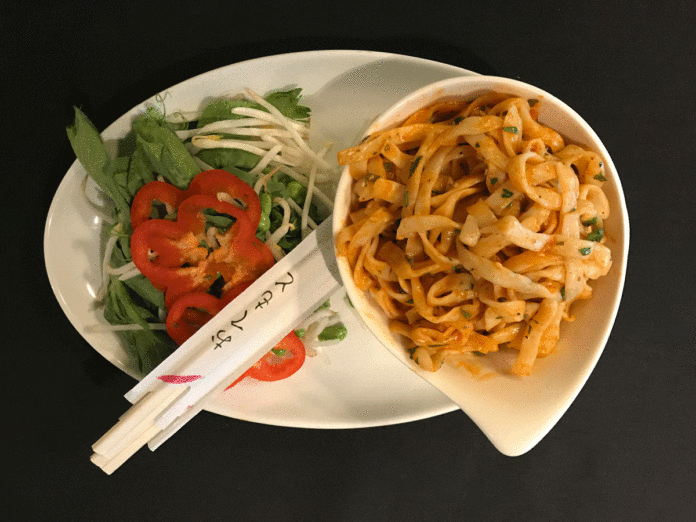Push that pasta aside. Noodles made from Alaska Pollock are poised to become a center of the plate favorite.
Alaska Pollock Protein Noodles from Trident Seafoods swept the awards at the 26th annual Alaska Symphony of Seafood new products competition in Juneau. The low carb, “flavor neutral” noodles contain 10 grams of protein per serving and can be swapped with any pasta favorites.
The ready to eat item drew raves from judges and samplers from Seattle to Southeast who gave the noodles quadruple awards at the Feb. 20 bash.
“That’s never happened before,” said Julie Decker, executive director of the Alaska Fisheries Development Foundation, host of the Symphony event. “It really blew everything out of the water.”
The new products played to a packed house as part of United Fishermen of Alaska’s annual legislative reception where everyone gets to sample and vote on the goods.
“It’s a great chance for policy makers to mix with people in Alaska’s statewide seafood industry,” Decker said. “Senator (Lisa) Murkowski gave away the grand prize. Lots of legislators were there and a number of them presented awards. A number of people from the governor’s office also attended.”
The annual competition kicks off at Pacific Marine Expo in Seattle in November where the new products are judged and first place winners in three categories are announced. All other winners are kept under wraps until the Juneau event.
Trident’s protein noodles took top honors in the retail category, People’s Choice awards in Seattle and Juneau and the overall grand prize.
Second at retail was Wild Alaskan Salmon Jerky by Fishpeople Seafood of Portland, Oregon; Smoked Sockeye Salmon Chowder by Heather’s Choice of Anchorage took home third place.
First place in the Food Service category was awarded to Alaska Cod Dumplings by Tai Foong USA, followed by Trident’s Entrée Redi pollock fillet portions.
Winner in the Beyond the Plate category, which features items made from seafood byproducts, was Wild Alaska Pollock Oil by Alaska Naturals Pet Products. Second place went to Tidal Vision’s crab shell based Tidal-Tex Odor Preventer that ‘de-funks’ footwear, camp gear and pet beds.
Top winners are automatically entered into the Seafood Excellence competition at the Seafood Expo North America March 17-19 in Boston.
Fishing updates
Hundreds of boats are out on the water all winter throughout the Gulf of Alaska and Bering Sea targeting pollock, cod, flounders, other whitefish and more.
The Bering Sea snow crab fishery is still ongoing as are openers for their bigger cousin, bairdi Tanners, in Southeast Alaska. The Tanner harvest should top one million pounds.
Southeast crabbers also are finishing off a golden king crab fishery which has a catch limit of 76,000 pounds.
A fishery for seven types of rockfish will remain open in outside waters of Southern Southeast until March 14 or until the fleet takes the nearly 112,000-pound quota, whichever comes first.
A Tanner crab fishery opened in Prince William Sound on March 1; Norton Sound’s red king crab fishery opened on February 25 with a winter harvest limit of 12,048 pounds.
The Pacific halibut fishery opens on March 15, soon to be followed by herring fisheries.
Love wild? Eat wild
Fish farming does little if anything, to conserve wild stocks. In fact, aquaculture has failed to reduce the pressure on the world’s fish stocks, it has not advanced fishery conservation, and should focus more on species lower in the food web, such as clams and other bivalves.
Those are the conclusions of a study published in Science Daily by researchers at the University of North Carolina, who base their findings on historical data from the World Bank and the UN Food and Agriculture Organization from 1970 to 2014.
Yet the push to convince consumers that eating farmed saves wild has gotten new life by meal kit makers LoveTheWild. The Boulder-Colorado based group, which launched its oven-ready farmed salmon, trout and barramundi offerings in 2014, has announced they will be available at Whole Foods stores nationwide this month.
Among their investors is actor Leonardo DiCaprio who claims that “the exploitation of our oceans has left many marine ecosystems on the brink of total collapse” and that LoveTheWild is “empowering people to take action on the crisis in a meaningful way.”
LoveTheWild omits the fact that meals and oils made from wild fish are used to feed farmed fish, thereby removing more from the ocean, not less. Also, many fish are grown in packed net pens and are routinely doused with additives, antibiotics and pesticides.
“There are some perceptions in the consumer market on the production and management of our wild fisheries that are misconstrued and quite frankly, wrong,” said Michael Kohan, seafood technical director for the Alaska Seafood Marketing Institute. “Alaska’s fisheries support over 60,000 jobs by people whose livelihood is putting wild fish on the market for people to purchase. You support wild fish by eating wild fish.”
Andy Wink, director of the Bristol Bay Regional Seafood Development Association, called the farmed saves wild push “misplaced.”
“Their hearts might be in the right place, but I don’t think they are thinking it through,” Wink said. “When you buy fish from a sustainably managed fishery, you’re voting with your dollars to support those who are doing things right.”
Fish funds
American Seafoods has issued a call for grant applications targeting community programs in Kodiak, the Aleutian and Pribilof Islands, Western Alaska Peninsula, Bristol Bay, Lower Kuskokwim, Lower Yukon, Norton Sound and regions north.
A total of $45,000 will be allocated in grants that typically range from $1,000 to $7,500 each for projects that focus on hunger, housing, safety, education and cultural activities.
Deadline to submit a request is April 10; the company’s Western Alaska Community Grant Board will select recipients on April 25.
Grant request forms are available online at www.americanseafoods.com or by contacting Kim Lynch at kim.lynch@americanseafoods.com or 206-256-2659.















